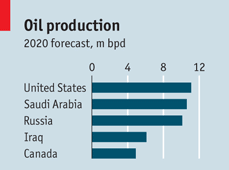Shell’s New Lens Scenarios mark the company’s 40th year of working with scenarios that anticipate the future. Their newest set of scenarios seek to consider what the world may look like in the year 2100. In honor of their 40th year of crafting scenarios, it would be worthwhile to review just what Shell anticipates for the future.
According to Shell, “The world in the future will be defined by how people and governments meet the challenges posed by institutions, inequality, and insecurity in relation to the paradoxes of prosperity, leadership, and connectivity.” Keeping this statement in mind, New Lens uses two very different scenarios to explore the future: Mountains, and Oceans.
In “Mountains”, Shell sees a world where those in power seek to maintain and promote the status quo. Economic development is moderate, while environmental and energy policy transforms our global transportation network to create cities that are more compact. Shell sees natural gas as the foundation for the world’s energy, with demand in oil peaking around the year 2035. Towards the end of the century hydrogen and electricity will be the energy source of choice to run automobiles.
Shell sees the world not achieving the goal of limiting global warming by 2°C, despite a decline in green house gas emissions beginning after 2030.
In “Oceans”, influence and power are more diffused. The world is more prosperous, but also more volatile. Market forces and society shape the world’s energy system, much more than government policy. Both oil and coal continue to play a major role, while natural gas and nuclear power, hampered by public resistance, slow technology adoption, and policy inertia, experiences limited growth. High energy prices and demand cause oil resources to be developed in hard to reach places, but demand plateaus around 2040. In the 2060s, solar becomes the largest primary source of energy, spurred on by the high prices which helped to encourage increased efficiency.
Shell’s glimpses into the future are intriguing, and Shell certainly puts much rigor into New Lens. Their outlook on the balance of power is very interesting, though there are a few things left that need resolution. Both shifts to alternative energy sources take place after peaks in demand. In making the transition to the next energy source in both scenarios, one can wonder how that transition will play out in the energy markets. Another observation is that presenting only two visions of the future, over a very long time horizon and with a very broad remit, seem a little limiting. The future may turn out to be more pluralistic than two scenarios on their own suggest.
In the end, 40 years of exploring the future is very admirable. Shell has set an example for other companies to follow in their ongoing efforts of studying the future. While there are some minor issues with the New Lens scenarios, both Mountains and Oceans present interesting views of the future and equally interesting implications. As a Futurist, but more importantly as a human being, I wonder which of these two futures we shall actually enjoy?
Jason Swanson
© The European Futures Observatory 2013
Resources:
The scenarios can be accessed at: http://www.shell.com/global/future-energy/scenarios/new-lens-scenarios.html
According to Shell, “The world in the future will be defined by how people and governments meet the challenges posed by institutions, inequality, and insecurity in relation to the paradoxes of prosperity, leadership, and connectivity.” Keeping this statement in mind, New Lens uses two very different scenarios to explore the future: Mountains, and Oceans.
In “Mountains”, Shell sees a world where those in power seek to maintain and promote the status quo. Economic development is moderate, while environmental and energy policy transforms our global transportation network to create cities that are more compact. Shell sees natural gas as the foundation for the world’s energy, with demand in oil peaking around the year 2035. Towards the end of the century hydrogen and electricity will be the energy source of choice to run automobiles.
Shell sees the world not achieving the goal of limiting global warming by 2°C, despite a decline in green house gas emissions beginning after 2030.
In “Oceans”, influence and power are more diffused. The world is more prosperous, but also more volatile. Market forces and society shape the world’s energy system, much more than government policy. Both oil and coal continue to play a major role, while natural gas and nuclear power, hampered by public resistance, slow technology adoption, and policy inertia, experiences limited growth. High energy prices and demand cause oil resources to be developed in hard to reach places, but demand plateaus around 2040. In the 2060s, solar becomes the largest primary source of energy, spurred on by the high prices which helped to encourage increased efficiency.
Shell’s glimpses into the future are intriguing, and Shell certainly puts much rigor into New Lens. Their outlook on the balance of power is very interesting, though there are a few things left that need resolution. Both shifts to alternative energy sources take place after peaks in demand. In making the transition to the next energy source in both scenarios, one can wonder how that transition will play out in the energy markets. Another observation is that presenting only two visions of the future, over a very long time horizon and with a very broad remit, seem a little limiting. The future may turn out to be more pluralistic than two scenarios on their own suggest.
In the end, 40 years of exploring the future is very admirable. Shell has set an example for other companies to follow in their ongoing efforts of studying the future. While there are some minor issues with the New Lens scenarios, both Mountains and Oceans present interesting views of the future and equally interesting implications. As a Futurist, but more importantly as a human being, I wonder which of these two futures we shall actually enjoy?
Jason Swanson
© The European Futures Observatory 2013
Resources:
The scenarios can be accessed at: http://www.shell.com/global/future-energy/scenarios/new-lens-scenarios.html

 RSS Feed
RSS Feed



